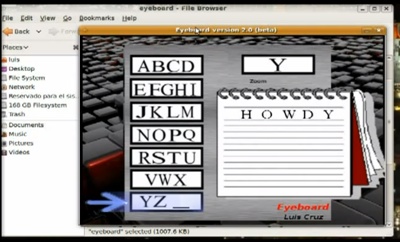I’m a little ashamed to admit that I spent the tail end of my high school career goofing off and trying desperately to appear cooler than I actually was. Fortunately for our future, people like Luis Cruz exist: this recent high school graduate designed the Eyeboard, a low-cost, open source eye tracking solution meant to make communication easier for disabled users.
While many prominent eye-tracking solutions use cameras to monitor the movement of a user’s eyes, the additional hardware means that they can be cost-prohibitive for the people who could use them the most.
Cruz’s Eyeboard takes a different approach: users wear a pair of glasses with a set of electrodes mounted inside, and an external board (powered by an ATMega328 microcontroller) measures changes in the resting potential of the retina that correspond to their movement. It isn’t the most precise way to go, but the simplicity of Cruz’s design means that the Eyeboard is far less expensive than more accurate alternatives.
The board runs into a PC, where the Eyeboard software (which is available in both Windows and Linux flavors) then interprets those voltage readings as movement inputs. The end result? An inexpensive way for users type out messages on-screen with just their eyes. And like I mentioned, Cruz’s project is entirely open source so people with specific use cases can feel free to tinker with his code as needed.
Eyeboard prototypes have been making the rounds for a few months now — his work was highlighted on CNN — but now comes the tricky part of actually producing Eyeboard kits en masse. For that, Cruz has turned to Kickstarter for support: while his early prototypes cost around $200 to $300 to build, interested investors can lock in a first-run Eyeboard kit for $95. It’s a niche product for sure, but with any luck, these things will start seeing use in underfunded schools and developing countries before long.
